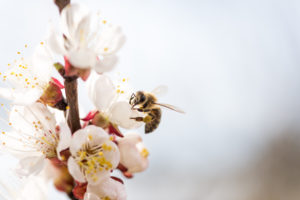
The time has come again to honor our beloved honey bee, and the beekeepers who tend to them, for all they do to sustain our planet, ecosystems, and our communities. World Bee Day is celebrated on May 20, but for us at the National Honey Board (NHB), World Bee Day is every day. We admire the hard work behind the centuries-old craft of beekeeping and recognize the bees’ positive impacts on economies around the world and within our ecosystem.
So what is the history of the occasion? Well, World Bee Day is celebrated on May 20th to coincide with the birthday of Anton Janša, the pioneer of beekeeping, who was born in 1734. During his time, he pioneered modern beekeeping techniques in Slovenia because he understood their value, praising the bees for their ability to work hard while being self-sufficient creatures.
The United Nations celebrated World Bee Day for the first time in 2018 after famous modern-day beekeeper, Peter Kozmus, petitioned the United Nations to declare May 20th a global day for bees. Today, World Bee Day is an opportunity for the global public to focus on the importance of preserving honey bees and other pollinators.
Did you know that more than 75% of the world’s food crops rely on pollinators like bees, butterflies, birds, bats, beetles, and moths?
Without bees, we wouldn’t have the nutritious foods we enjoy and rely on. According to the Food and Agriculture Organization of the United Nations, bees play an essential role in keeping both the planet and its people nourished.
But it’s not just about the pollination and the foods that honey bees produce, it’s also about the positive impact the beekeeping profession has on communities. A couple of years ago we shared just some of the global impacts of beekeeping, but this year we want to bring it home and highlight a special program here in the U.S. that is using beekeeping to save its community.
As part of our Celebrating Beekeeping video series, we had the great honor to meet and share the story of some of the people behind the Appalachian Beekeeping Collective. Theirs is a story of a community in the Appalachian region of West Virginia, once dominated by coal mining, whose residents fell upon hard times after the mines closed, causing many to move out of the area. For those who remained, finding work has been difficult – and this is where the Appalachian Beekeeping Collective (ABC) has stepped in. A project of non-profit Appalachian Headwaters, the ABC “trains, supports, and provides bees and equipment at no cost to partner beekeepers in economically distressed Appalachian communities.” This program allows participants to not only give back to the planet around them, but provides them with income, allowing them to stay on the land they feel so connected to. To date, the ABC has over 100 beekeepers, has planted 300,000 trees since 2020, and donated 3,000 pounds of honey. Learn more about their story in the video below.
With a focus on ecological restoration and environmental education, Appalachian Headwaters strives to restore the native forests of central Appalachia, starting by reclaiming the mountaintop coal mining sites in the region. To that end, Appalachian Headwaters launched the Appalachian Pollinator Center in 2020 to explore “the ecology of honey bees, native pollinators, and native plants in [the] region.”
On World Bee Day, join us as we continue to celebrate the hard work of beekeepers and bees, and help us raise awareness of the importance of bees. By spreading awareness about how we can better support the world’s bees, we can help grow the beekeeping profession around the world and watch it transform both the natural world and economies. Looking for a simple way to get involved? Share one of our Celebrating Beekeeping videos to your friends and followers on social to share the essential role bees and beekeepers play in keeping both the planet and its people nourished.
